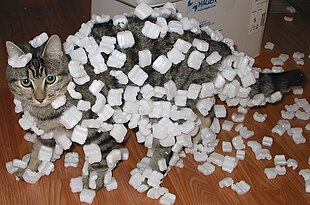
Back Elektrostatik ALS स्थिरवैद्युतिकी ANP السكونيات الكهربائية Arabic Electrostática AST Elektrostatika Azerbaijani Электрастатыка Byelorussian Электрастатыка BE-X-OLD Електростатика Bulgarian Elektrostatika BS Electroestàtica Catalan
| Articles about |
| Electromagnetism |
|---|
 |

Electrostatics is a branch of physics that studies slow-moving or stationary electric charges.
Since classical times, it has been known that some materials, such as amber, attract lightweight particles after rubbing. The Greek word for amber, ἤλεκτρον (ḗlektron), was thus the source of the word 'electricity'. Electrostatic phenomena arise from the forces that electric charges exert on each other. Such forces are described by Coulomb's law.
There are many examples of electrostatic phenomena, from those as simple as the attraction of plastic wrap to one's hand after it is removed from a package, to the apparently spontaneous explosion of grain silos, the damage of electronic components during manufacturing, and photocopier and laser printer operation.
The electrostatic model accurately predicts electrical phenomena in "classical" cases where the velocities are low and the system is macroscopic so no quantum effects are involved. It also plays a role in quantum mechanics, where additional terms also need to be included.
- ^ Ling, Samuel J.; Moebs, William; Sanny, Jeff (2019). University Physics, Vol. 2. OpenStax. ISBN 9781947172210. Ch.30: Conductors, Insulators, and Charging by Induction
- ^ Bloomfield, Louis A. (2015). How Things Work: The Physics of Everyday Life. John Wiley and Sons. p. 270. ISBN 9781119013846.
- ^ "Polarization". Static Electricity - Lesson 1 - Basic Terminology and Concepts. The Physics Classroom. 2020. Retrieved 18 June 2021.
- ^ Thompson, Xochitl Zamora (2004). "Charge It! All About Electrical Attraction and Repulsion". Teach Engineering: Stem curriculum for K-12. University of Colorado. Retrieved 18 June 2021.